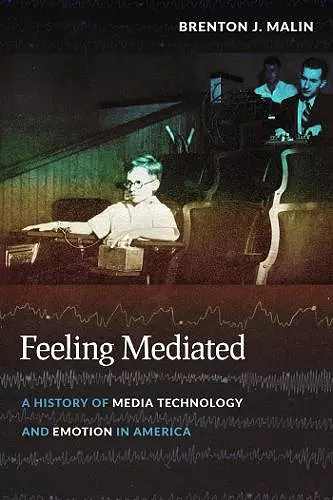Feeling Mediated
A History of Media Technology and Emotion in America
Format:Paperback
Publisher:New York University Press
Published:28th Mar '14
Currently unavailable, and unfortunately no date known when it will be back
This paperback is available in another edition too:
- Hardback£77.00(9780814762790)

New technologies, whether text message or telegraph,
inevitably raise questions about emotion. New forms of communication bring with
them both fear and hope, on one hand allowing us deeper emotional connections
and the ability to forge global communities, while on the other prompting
anxieties about isolation and over-stimulation. Feeling
Mediated investigates the larger context of such concerns, considering both
how media technologies intersect with our emotional lives and how our ideas
about these intersections influence how we think about and experience emotion
and technology themselves.
Drawing on extensive archival research, Brenton J. Malin explores
the historical roots of much of our recent understanding of mediated feelings,
showing how earlier ideas about the telegraph, phonograph, radio, motion
pictures, and other once-new technologies continue to inform our contemporary
thinking. With insightful analysis, Feeling
Mediated explores a series of fascinating arguments about technology and
emotion that became especially heated during the early 20th century. These debates, which carried forward and
transformed earlier discussions of technology and emotion, culminated in a set
of ideas that became institutionalized in the structures of American media
production, advertising, social research, and policy, leaving a lasting impact on
our everyday lives.
"This is an important book for thinking about the relationship between science and public culture. Instead of simply looking at media representations of science, it demonstrates so well how the public sphere itself is a sociotechnical assemblage of networked devices, concepts, bodies, measurements, and various audiences. Malin steers a clear course between technological determinism and social constructivism. We think, feel, and act in relationship with our tools, but it is precisely this relationship that matters. In the end, he leaves the reader with a rich picture of mass media as an assemblage whose infrastructure includes the often neglected social technologies of the human sciences." * American Historical Review *
"A wide mixtureof scholarly disciplines across the last century contribute to Malin's history. They are represented by social scientists, psychologists, media and communications theorists, as well as philosophers. For historians of psychology, Feeling Mediated offers extended commentary on the work of three psychologists who are less frequently acknowledged in the literature." * PsycCritques *
"[] Malin sharpens his weapons against prevalent narratives of oversimplification, which many times also serve to perpetuate discrimination by class, gender, and race. Nailing the big irony of this trope, Malin also argues how the laboratory instruments measure other new technologies in ways that create a complex feedback loop." * Journalism & Mass Communication Quarterly *
"[B]y locating administrative research in a broad cultural setting, and, in particular, by characterizing it in a novel way as & media physicalism, [Malin]helps to explain how an influential tradition in American communications studies took the form that it did." * Journal of Interdisciplinary History *
"Indeed one of the great many joys in readingFeeling Mediatedis its clear, breezy writing that is unencumbered by jargon. It is a page-turner, a rarity in academic books, especially those that take up emotion as a focus.Scholars in media and communication and technology history, cultural and American Studies are likely to find this book most interesting." * Journal of Communication *
"Using a wide range of archival research and several historical examples of technology's relationship with emotion, Malin demonstrates how communication technology changed the way people think about emotion and continues to . . . . Malin also offers audiences a way to understand their own emotional process in relation to new technologies, which makes this book a worthwhile read for anyone who communicates with a 'feeling machine.'" * International Journal of Communication *
"In reconstructing the debates surrounding media physicalism, Malin draws on substantial archival and primary-source research, and brings in as well intelligent discussions of the history of psychology and the philosophy of mind. Ultimately, his critique of media physicalism underscores the necessity of apprehending the historical situatedness of media technologies, showing how race, class, and gender norms were built into various media and the systems set up to measure their impact." * Journal of American History *
"Malin has written an illuminating study, bringing to our attention areas of research and thinking, some now quite neglected, that are concerned with the complex relationship between media technologies and our emotional lives." * European Journal of Communication *
"An engaging work on emotion-inducing and sensing technologies, the concerns surrounding them, and their uptake within the early- to mid-20th century scientific community. Replete with fascinating gems that reveal our preoccupation with emotionality and its relationship to communication technologies,Feeling Mediatedis a compelling foray not only into the history of media but also that of media studies." -- Ted Striphas,Indiana University
"As modern ideas of communication as transmission emerged, so too did the belief in emotions as forces within the body.BrentonMalinsFeeling Mediatedchronicles these intertwined histories.Malins book juxtaposes the idea of media physicalismthat media have direct effects on audiences emotionsalongside the history of & American cool as a desired emotional state, constantly under threat from too-hot media.Feeling Mediatednot only contributes to the growing cross-fertilization of media studies and affect theory, it also provides a new account of why, for the last two centuries, each generation has made the same claims for the emotional power of emerging media." -- Jonathan Sterne,author of MP3: The Meaning of a Format
ISBN: 9780814760574
Dimensions: unknown
Weight: 481g
317 pages